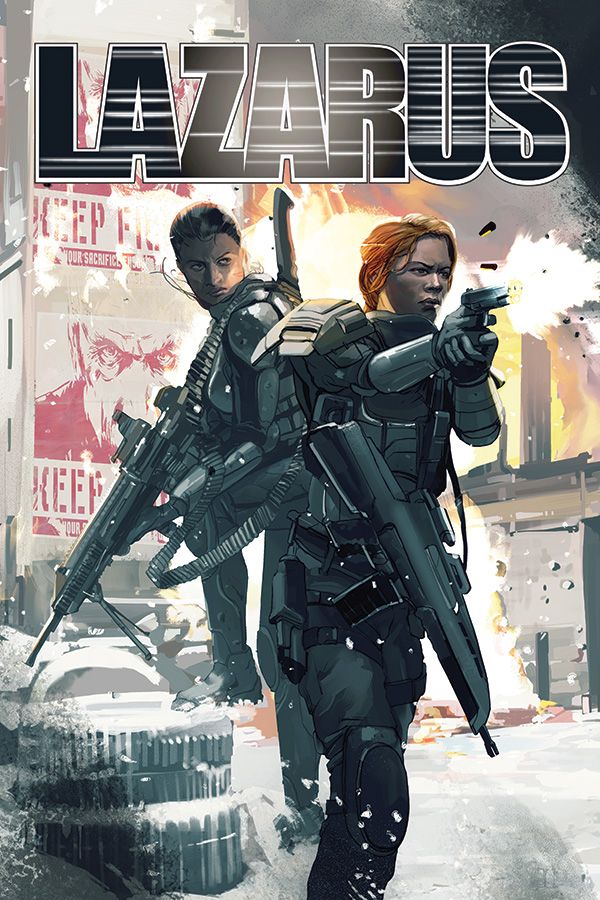In "Lazarus" #18 by Greg Rucka and Michael Lark, Forever is in charge, but she's never been so far from the reader. From previous flashbacks, it's clear that she's led such military missions before, but this is the first time the reader gets to see Forever among the troops.
Previously, the reader was privy to Forever's doubts and vulnerability when she was among equals or superiors, so it's a significant change to see Forever only though from the eyes of those around her, who are subordinate to her. With Forever's mind closed to the reader, her physical presence is foregrounded. Lark has a brilliant ability to give Forever dancer-like grace and energy without overdoing it. His wiry linework has a controlled force that only becomes more impressive over time. Boss does a good job with assisting on the inks, because there's no discontinuity between pages. Arcas' colors guide the mood, making the rare touch of color on a face or from bloodshed feel especially warm and human.
Exaggerated Kirby-esque verve is a benchmark for superhero comics, but that style would be out of place in "Lazarus," which strives for realism when it's not being deliciously unrealistic in its drama levels. Rucka and Lark are trying to depict heroism and evoke admiration for particular warriors and the art of strategy, without glorifying warfare in general. They mostly pull it off. Forever and Casey look good, because they are using their talents and keeping their souls, but the war feels ugly and exhausting.
The only other time that Forever has shared significant panel time with Serfs or Waste was in the very first issue, when she was a reluctant executioner. In this "Poison" story arc, the reader's sympathies and point of view shift to Casey Solomon and Michael Barrett, two characters that were well-developed by the end of the "Lift" story arc. Since both of them are Serf newbies, their perspectives as they enter service give special insight into the Carlyle Family.
In the opening scene, Forever is harder and colder in the field than she is at home, both in her actions and her demeanor to her own team. Rucka lets this go on for a while, before putting a crack in Forever's toughness when she has a one-on-one moment with Casey. This scene was inevitable, and Rucka's snappy dialogue and tight pacing alongside Lark's facial expressions make it emotionally satisfying as well.
On a lesser note, the scene where Shoe is caught out by Forever is an old gag but it's still funny. There's also an effective "gotcha" joke in the middle of the issue when Michael is working in a conference room. These rare moments of humor are valuable on multiple levels. They give the reader a break from an otherwise grim tone, just like Casey's question to Forever. On a subtler level, each of these moments says something good about Carlyle. Carlyle's governance is oppressive, but humor is still possible and permitted. These scenes are small notes, but together they show a progression in how the Casey and Michael view the Family, from fear to a sense of belonging and respect.
Rucka makes Hock's fascist goals and tactics believable. He's a compelling villain. His methods are like a car wreck, inspiring equal parts horror and fascination, except that the carnage is all inside. However, Hock's evil is too convenient for the plotting. It's too morally convenient for both Forever and the readers to have no qualms about killing "every last one" of Hock's troops, because it's so obvious that Hock is worse than Carlyle.
Lark's page composition gives the cliffhanger ending some initial shock value, but it's not a huge surprise within the larger themes of Rucka's ideas. "Lazarus" is in part a coming of age story, complete with a battery of physical and moral challenges.
All the action in "Lazarus" #18 serves the story, either by moving chess pieces into new places or by providing extra dimension and texture to major and minor characters. Its dominant atmosphere is one of vigilance and restlessness, of quiet striving. It winds the reader up tighter and tighter, building tension for events that are coming into focus on a quickly approaching horizon.

